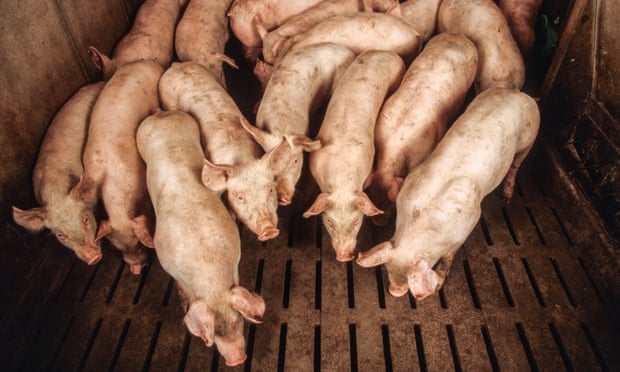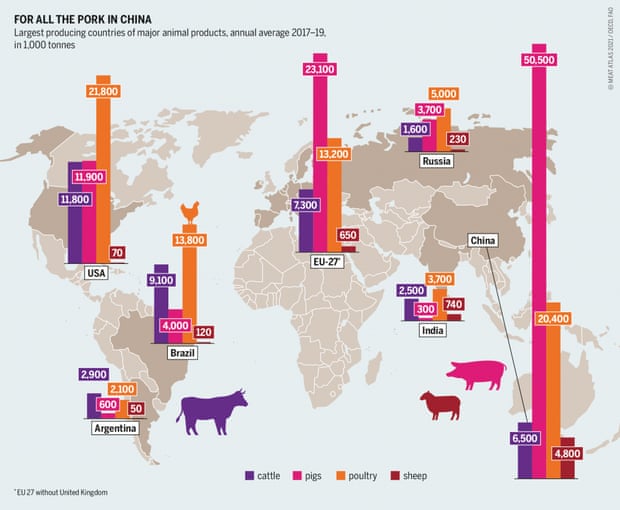November 27, 2025 | 15:06 GMT +7
November 27, 2025 | 15:06 GMT +7
Hotline: 0913.378.918
November 27, 2025 | 15:06 GMT +7
Hotline: 0913.378.918

From 2015 to 2020, global meat and dairy firms received more than US$478bn in backing, according to the Meat Atlas. Photo: Alamy Stock
Twenty livestock companies are responsible for more greenhouse gas emissions than either Germany, Britain or France – and are receiving billions of dollars in financial backing to do so, according to a new report by environmental campaigners.
Raising livestock contributes significantly to carbon emissions, with animal agriculture accounting for 14.5% of the world’s greenhouse gas emissions. Scientific reports have found that rich countries need huge reductions in meat and dairy consumption to tackle the climate emergency.
Between 2015 and 2020, global meat and dairy companies received more than US$478bn in backing from 2,500 investment firms, banks, and pension funds, most of them based in North America or Europe, according to the Meat Atlas, which was compiled by Friends of the Earth and the European political foundation, Heinrich Böll Stiftung.
With that level of financial support, the report estimates that meat production could increase by a further 40m tonnes by 2029, to hit 366m tonnes of meat a year.
Although the vast majority of growth was likely to take place in the global south, the biggest producers will continue to be China, Brazil, the USA and the members of the European Union. By 2029 these countries may still produce 60% of worldwide meat output.
Across the world, the report says, three-quarters of all agricultural land is used to raise animals or the crops to feed them. “In Brazil alone, 175m hectares is dedicated to raising cattle,” an area of land that is about equal to the “entire agricultural area of the European Union”.
The report also points to ongoing consolidation in the meat and dairy sector, with the biggest companies buying smaller ones and reducing competition. The effect risks squeezing out more sustainable food production models.
“To keep up with this [level of animal protein production] industrial animal farming is on the rise and keeps pushing sustainable models out of the market,” the report says.
The recent interest shown by animal protein companies in meat alternatives and substitutes was not yet a solution, campaigners said.

Across the world, three-quarters of all agricultural land is used to raise animals or the crops to feed them, the report says. Photo: Meat Atlas
“This is all for profit and is not really addressing the fundamental issues we see in the current animal protein-centred food system that is having a devastating impact on climate, biodiversity and is actually harming people around the globe,” said Stanka Becheva, a food and agriculture campaigner working with Friends of the Earth.
The bottom line, said Becheva, is that “we need to begin reducing the number of food animals on the planet and incentivise different consumption models.”
More meat industry regulation is needed too, she said, “to make sure companies are paying for the harms they have created throughout the supply chain and to minimise further damage”.
On the investment side, Becheva said private banks and investors, as well as development banks such as the World Bank and the European Bank for Reconstruction and Development needed to stop financing large-scale, intensive animal protein production projects.
Responding to the report, Paolo Patruno, deputy secretary general of the European Association for the Meat Processing Industry (CLITRAVI), said: “We don’t believe that any food sector is more or less sustainable than another. But there are more or less sustainable ways to produce plant or animal foods and we are committed to making animal protein production more sustainable.
“We also know that average GHG [greenhouse gas] emissions in the EU from livestock is half that of the global average. The global average is about 14% and the EU average is 7%,” he added.
In England and Wales, the National Farmers’ Union has set a target of reaching net zero greenhouse gas emissions in agriculture by 2040.
(The Guardian)

(VAN) A new study reveals how the simultaneous effects of ocean acidification, salinity and loss of oxygen are making the world more fragile.

(VAN) Hopes are growing that the creation of the first 3D turkey gut model could be a turning point in the battle against the virulent blackhead disease.

(VAN) Tyson, America’s biggest meat supplier, plans to shutter one of its largest beef processing plants as the industry continues to struggle with low cattle supplies and political pressure from Washington.

(VAN) New FAO study shows how digital solutions are empowering farmers and fishers to prevent losses and build resilient agrifood systems.

(VAN) Brazil's COP30 presidency pushed through a compromise climate deal on Saturday that would boost finance for poor nations coping with global warming but that omitted any mention of the fossil fuels driving it.

(VAN) Poultry farmers in the UK have been warned that they could face one of the worst winters yet for bird flu.

(VAN) Prices of main-crop paddy have risen sharply, with jasmine rice hitting 16,100 baht per tonne — the highest level in years.